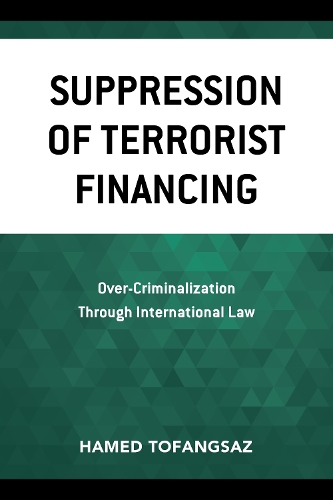
Suppression Of Terrorist Financing: Over-Criminalization Through International Law
(Paperback)
Publishing Details
Suppression Of Terrorist Financing: Over-Criminalization Through International Law
By (Author) Hamed Tofangsaz
Bloomsbury Publishing PLC
Lexington Books
20th December 2021
United States
Classifications
Professional and Scholarly
Non Fiction
International law
Terrorism, armed struggle
345.02317
Physical Properties
Paperback
270
Width 152mm, Height 231mm, Spine 20mm
408g
Description
In the last few decades, there has been a considerable effort, mainly from Western liberal countries, to create, develop, and diffuse into domestic laws, an internationally harmonized counter-terrorist financing regime through international treaties, recommendations and resolutions. This book aims to explore the penal (criminalization and confiscation) measures of the regime. Belonging to the category of analytical research, the book explores the nature of terrorist financing, and critically and extensively examines how it has been conceptualized and criminalized. The book argues that the application of these penal measures results in over-criminalization due to the vague conceptualization of the concept of terrorist financing, and due to its incompatibility with basic notions of criminalization and fundamental principles of the criminal law of many countries specifically Anglo-American law. Examining a number of ASEAN countries law on terrorist financing, the book then shows how these controversial measures have been crept into their law, resulting in the violation of human rights and democratic values which Western countries seek to promote.
Reviews
The authors thesis about over-criminalization is clearly stated and grounded in an understanding of the theoretical literature on the appropriate grounds for the application of criminal sanctions, both in national and international law. His treatment is comprehensive and the methodology is impeccable. -- Roger S. Clark, Board of Governors Professor, Rutgers Law School, Camden, New Jersey
This book is a careful study of the international suppression of terrorist financing. It mounts a valuable critique of the rule of law and human rights costs of ambiguous or excessive measures, including the criminalization of preparatory or non-blameworthy conduct that is too remote from the realization of actual terrorist harm to warrant punishment. -- Ben Saul, University of Sydney
Author Bio
Hamed Tofangsaz is law graduate of the University of Waikato, New Zealand.
